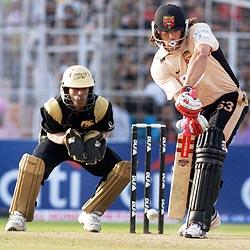Read a lot of Indian Premier League (IPL)-related stories and watched a couple of matches in full, others sporadically -- over the last three days. A round up of the more notable articles follows in course of my day; for now, this news story in the Times of India for your attention. It is a good thing -- on better late than never lines -- that the BCCI [IPL] woke up to the fact that the Kolkata wicket was a total disgrace, and decided to do something about it; it is also an interesting indicator that the BCCI is more responsive to the needs, and angst, of franchisees than it has ever been to the needs of international cricket. What intrigued me though was this bit:
Meanwhile, a top IPL official scoffed at rumours that renowned Australian curator Les Burdett had been approached by the Kolkata team management to air-dash to Kolkata and fix the crumbling pitch."It's not for the franchisees to decide on technical matters. Only the IPL governing council has jurisdiction over such matters. Modi was at the Eden, so was Ravi Shastri, who is also a member of the council. They have taken note of the woeful pitch and instructed Daljit to address the problem before the Kolkata team's next home match," the official told.
 Ooo, the BCCI's amour propre appears to have taken a bit of a hit. The thing though is, that organization is missing a good bet here. Instead of insisting that it will personally supervise everything from the nature of the pitch to the length of grass on the outfield -- not highly recommended, for a body that is not known to be good at paying attention to detail --the BCCI needs to hand over one stadium to each franchisee as its home ground.
Ooo, the BCCI's amour propre appears to have taken a bit of a hit. The thing though is, that organization is missing a good bet here. Instead of insisting that it will personally supervise everything from the nature of the pitch to the length of grass on the outfield -- not highly recommended, for a body that is not known to be good at paying attention to detail --the BCCI needs to hand over one stadium to each franchisee as its home ground.
Imagine the benefits: Firstly, the cash-rich franchisees will vie with each other to ensure that its home ground is better than the others in terms of facilities [and considering the monies the franchisees are spending already, the additional outlay will not be particularly daunting for any of them]; that alone ensures that the BCCI, at no expense to itself, gets to upgrade eight stadiums to state of the art status. A corollary is that the various franchisees will spend good money on preparing the best possible pitches and outfields; they are likely, too, to prepare wickets that suit their bowling and batting strengths, so you will likely see the competition played out on different types of wickets, thus increasing the challenges for the participating teams and, in the process, ensuring that those players who are playing in the league will gain expertise of batting and bowling in different conditions.
What's the downside to this, the reason the BCCI will not consider such an option? Nothing -- except that the board takes the word 'control' in its name a touch too seriously.
Photograph: PTI






